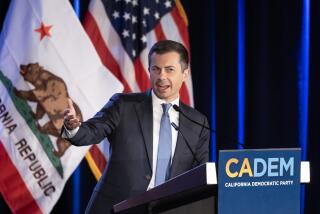Candidates woo conservatives
WASHINGTON — Republican presidential contenders Rudolph W. Giuliani and Mitt Romney made their case to influential conservatives Friday, positioning themselves as allies to the gathering despite mixed records on such high-profile social issues as abortion, gay marriage and stem cell research.
Romney, the former Massachusetts governor, and Giuliani, the former New York mayor who has staked out an early lead in polls of the GOP rank-and-file, each drew overflow crowds of several thousand at the annual meeting of the Conservative Political Action Conference.
Also addressing the crowd, but attracting less attention, were four GOP candidates with more solid conservative credentials but lesser national identities -- Sen. Sam Brownback of Kansas, former Arkansas Gov. Mike Huckabee, Rep. Duncan Hunter of El Cajon, and Rep. Tom Tancredo of Colorado.
Noticeably absent was Sen. John McCain of Arizona, who in his second bid for the Republican presidential nomination has sought to overcome opposition from the party’s conservative base that helped doom his campaign in 2000. But McCain has made little discernible headway among the activists at Friday’s event and he skipped it to campaign in Utah and his home state.
The conference is sponsored by the American Conservative Union and dozens of other like-minded organizations, and it provides an opportunity for power brokers based in Washington and conservative leaders elsewhere in the country to compare notes and plot strategy.
Giuliani pitched himself as a fiscal conservative who in New York cut taxes, reduced crime and thinned out welfare rolls -- and would do the same at the national level. He defended the Bush administration for launching the war in Iraq, conducting a controversial domestic spying program and enacting the Patriot Act, saying that the U.S. needs to remain “on the offensive” in fighting terrorism.
Giuliani did not disavow his support for abortion rights, gay rights and gun control -- issues he did not mention in his speech. But in a clear reference to his stands, he called for conservatives to embrace President Reagan’s brand of big-tent Republican politics.
“We don’t all agree all the time,” Giuliani told his audience. “But the point of a presidential election is to decide who you believe the most.”
He received sporadic applause during his remarks. Romney, who spoke several hours later, provoked a more enthusiastic response.
Romney criticized McCain by name, taking the senator to task for his efforts to rewrite campaign finance laws and immigration policy -- comments that brought applause.
The former governor did not mention Giuliani. But in a possible effort to contrast himself with the former mayor, who has been married three times, Romney invited his wife, Ann, to join him at the podium. She made a point of noting that they will celebrate their 38th wedding anniversary this month and that they have five sons and 10 grandchildren.
Romney’s efforts to court support from conservatives has been hampered by criticism that he has only recently embraced their positions on various social causes after airing more liberal views while seeking office in Massachusetts. For instance, in a failed 1994 Senate race, he stressed his support for gay rights. And he has acknowledged that he has changed his view on abortion, opposing it after previously taking a pro-choice position.
On Friday, he detailed his efforts to fight gay marriage and stem cell research during his four years as governor.
“I stood at the center of the battlefield on every major social issue, and I defended the sanctity of human life,” Romney said, prompting a standing ovation.
Some of those at the conference said they remain unconvinced that Romney or Giuliani would stay true to conservative causes if either won the White House.
“People are tired of seeing people coming in right and turning left,” said the Rev. LeRoy Thomas, chaplain for the National Black Republican Assn. He supports Brownback.
But David Bellows, an instructor at the Rev. Jerry Falwell’s Liberty University in Lynchburg, Va., said many conservatives would be willing to compromise on candidates who do not agree with them on every issue but share their general values. “We need to ... concentrate on whether they are conservative in their values, not necessarily whether they are antiabortion or not, “ he said.
Some who arrived at the conference undecided left with Romney campaign signs, including Margo Saule, 65, a horse breeder from Charlottesville, Va.
Saule called Romney’s speech “straightforward,” saying “I liked his convictions.”
As for his recent change on abortion, Saule said it did not bother her.
“People change their minds,” she said. “I don’t think he changed his opinions to become more electable.”
Others said that Giuliani would do a better job of protecting the country from terrorism, and that his track record on national security trumped his liberal leanings on social issues.
“He’s great on protecting us from terror, bringing down crime and taxes,” said June Nichols, 70, a consultant from Merritt Island, Fla.
The day’s most controversial speaker proved to be conservative pundit Ann Coulter, who at the end of her speech -- which followed Romney’s -- used a slur to refer to Democratic presidential candidate John Edwards.
Coulter said she had intended to comment on the former senator from North Carolina, “but it turns out you have to go into rehab if you use the word ‘faggot,’ so I ... can’t really talk about Edwards.”
The Democratic National Committee chairman, Howard Dean, quickly issued a statement calling on the GOP presidential candidates at the conference to “denounce her hateful remarks.”
A Giuliani spokeswoman said she had not heard the speech, and a Romney spokesman did not return calls late Friday.
molly.hennessy-fiske@latimes.com
More to Read
Get the L.A. Times Politics newsletter
Deeply reported insights into legislation, politics and policy from Sacramento, Washington and beyond. In your inbox three times per week.
You may occasionally receive promotional content from the Los Angeles Times.











